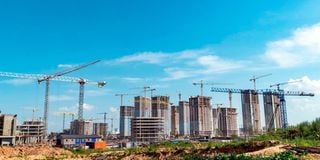Premium
Wondering where to invest your money? Kenya’s real estate industry is where you should be looking

The latest Economic Survey 2023, released in early May by the Kenya National Bureau of Statistics, shows that Kenya’s construction sector grew by 4.1 per cent in the year 2022 alone.
Kenya’s real estate industry has been growing at a rapid pace, one that has not been witnessed in years. The latest Economic Survey 2023, released in early May by the Kenya National Bureau of Statistics, shows that Kenya’s construction sector grew by 4.1 per cent in the year 2022 alone.
This growth outpaced that of many other sectors, including manufacturing, services, agriculture and even equities. Many investors have been opting for real estate as their preferred investment vehicle, dumping other assets such as equities, which were once a favourite.
In 2022, real estate reportedly accounted for 40 per cent of most rich Kenyans’ investment portfolios. These individuals announced that they plan to continue investing their wealth in real estate, in particular, private rental property, seeing these assets as a reliable cushion against shocks such as currency depreciation and inflation.
Regulation
One of the factors that has driven the increased interest in real estate is a relaxed regulatory environment. For instance, the Economic Survey 2023 shows that the number of building plans that were approved by Nairobi City County increased by 58 per cent in 2022.
This paved way for real estate investments worth more than Sh162.5 billion into the country’s capital city.
Ribin Ondwari, a partner and Head of Real Estate, Banking and Financial Services at Ashitiva Advocates LLP, says that though a lot of work still remains to be done for the industry to have a completely favourable regulatory framework, some of the policy reforms that have been made by the government are an effort in the right direction.
“The push to implement policies such as the sectional properties act for instance, which enables proper clarification and regulation for ownership of apartment units and office blocks that have become very popular in the urban setup, is a welcome move amongst the real estate community,” observes Ondwari.
The conveyancing practitioner however says that other policy proposals, such as the Finance Bill 2023, which seeks to withdraw some incentives and introduce new levies to expand the tax base, could pose a threat to the gains made in the industry.
“At the moment, everyone is complaining because of the direction government is taking in terms of the proposals for taxing the market, but since these are new proposals, we are still analysing them and trying to see how they will affect the industry. It hasn’t settled yet, but the obvious sentiment is that there should be some bit of leeway given to investors, in as much as we understand the direction government is taking in trying to cover as much tax base as possible for the country to support itself,” comments Ondwari.

Ribin Ondwari is a partner and the Head of Real Estate, Banking and Financial Services at Ashitiva Advocates LLP.
Infrastructure
Developments in infrastructure, have also made real estate an attractive option for developers as well as investors, driving growth of the sector. The Economic Survey 2023 shows that the length of national roads under bitumen increased from 18,700 kilometres in 2021 to 19,100 kilometres in 2022.
Overall, government-approved expenditure on housing infrastructure for 2022/23 is expected to increase to Sh19 billion from Sh14.1 billion in 2021/22, while that of roads is expected to rise to Sh191.4 billion in the same period.
“The bypasses and various roads that have been developed have opened up a lot of areas. Developers are now able to set up residential developments in places that would seem far from the CBD. Because of that ease of access, people with disposable incomes are buying apartments out of town not necessarily to live in, but to rent them out for extra income,” notes Ondwari.
A recent study by real estate firm, HassConsult, showed that improvements in infrastructure, especially in the satellite towns of the country, have significantly raised the value of land and property in these areas.
The proposal to extend the Standard Gauge Railway to Athi River's Export Processing Zone, for instance, sparked speculation that led to a 6.1 per cent increase in land prices in Athi River, in the first quarter of 2023.
The growth rate was comparable to that in Ngong - the best-performing satellite town currently in terms of growth in property prices, which witnessed a 6.2 per cent surge in land prices, also as a result of developments in the road network and other infrastructure.
“In the first quarter of 2023, nearly all towns posted positive growth on apartment rental pricing, highlighting the increasing occupancy rate of apartments targeted at renters with a monthly budget between Sh25, 500 and Sh50, 000,” read the HassConsult report in part.
Youthful Population
Perhaps one of the factors that have really impacted the growth of the real estate industry though, is a growing youthful population, which currently accounts for nearly 80 per cent of Kenya’s total population.
While this group does not necessarily have the vast amounts of resources needed to make large real estate purchases compared to the older generations, advocate Ondwari points out that these individuals are very creative when it comes to investing in real estate, and this creativity is spurring the growth of the sector.

One of the factors that has driven the increased interest in real estate is a relaxed regulatory environment.
For instance, instead of purchasing properties in city outskirts such as Kisaju, Athi River, Kitengela or Kimuka, then waiting for the property value to increase over time - a trend witnessed mostly amongst the older generation, these individuals may instead opt to purchase apartments under the affordable housing scheme in urban areas such as Pangani.
They may do this not for their own occupation, but for investment purposes where they rent out the apartment perhaps as Airbnbs to earn extra rental income.
“The market has also started responding to this group of buyers, where you see some developers coming up with units that are more affordable to people who have just started having some disposable income.”
He adds that models such as rent-to-own have also become common. Other developers go as far as to get the buyer a tenant, so your job is just to purchase while the developer does everything for you in terms of house and tenant management, after which you get your rental income at the agreed-upon timeline.
Compared to their seniors, Chacha Collins, a realtor, observes that the younger generation are also more aggressive buyers, and have an appetite for quicker acquisitions of real estate property, spurring a more rapid growth of the sector.
“Young people’s preferences are starting to shape the way the real estate business is being done. In a few years, they will overtake baby boomers as the generation purchasing the largest number of homes,” notes Chacha.
The realtor attributes the younger generation’s appetite for quick acquisitions of real estate property to their exposure to social media, which seems to have promoted a sort of instant gratification culture amongst them.
“They don’t like to wait. They don’t seem to want to take on things such as renovations. They would rather move right in,” says Chacha.
The downside of this instant gratification attitude is that it causes a wider gap in price, value, and days on the market between older properties and new ones, even if the old properties were very well built.
“Older generations were more open to renovating an old property and appreciated the value in something that wasn't staged or simply well- photographed,” adds Chacha.
The upside of this high appetite is that transactions get to move quickly. Unlike older buyers, the realtor notes that young clients are also not bothered to be asked for details such as bank statements, employment verifications or other personal data required for mortgage approvals.
“The younger people are used to supplying everything about who they are online, so they'll give you everything. This helps to move transactions quickly,” argues Chacha.
Moreover, this generation is exposed to modern technology such as mobile applications which they can use to check listings and gather information on several properties at once, enabling them to make decisions faster. Meanwhile, savvy realtors use technologies such as 3D tours and augmented reality to make sales easier and more interactive.
“They come having already done their homework. They rarely need agents to find homes for them to see. They usually have their own list, and they've already researched comparable sales and chosen a neighbourhood. With them we do not control information, what they need is for us to interpret the information. At times, that can mean demonstrating that the information is not accurate, but this generation may not simply take the agent's word without proof and visuals,” notes Chacha.

In 2022, real estate reportedly accounted for 40 per cent of most rich Kenyans’ investment portfolios.
Because they are so quick and tech-savvy, Chacha says developers and real estate agents, a majority of whom tend to be considerably older than the home-buying population they serve, have a challenge in keeping up. The realtor however notes that adjusting to the needs of this group is necessary, if one wishes to remain relevant in the industry.
“The younger generation has left a lasting impression on the housing market, and more changes may be on the way as this generation becomes the biggest off-takers of real estate. Focusing on the positive impacts the young generation has created is key to keeping that evolution in perspective. An emphasis on technology, for example, may result in a streamlined, more efficient home-buying process. And more young people moving to the suburbs could help balance out the effects of rising housing prices in urban areas,” says Chacha.
A Strong Diaspora
According to a recent Central Bank of Kenya survey, since the year 2017, diaspora remittances into the country have grown by more than 200 per cent from about Sh215.4 billion to Sh453.6 billion in 2022.
Interestingly, more than half of the money that Kenyans living and working abroad remit back home is used to purchase land, repay mortgages or develop properties.
Having previously worked and lived abroad, Naftali Oswere, who runs Bantu Homes, can attest to this, explaining that for many people living abroad, real estate is the most sensible way for them to invest their money back home.
The developer notes that factors such as a strong dollar, and policies that make it easier for Kenyans living in the diaspora to transfer money back home or to invest in the real estate market have also worked to encourage more diaspora remittances.
“The diaspora is the biggest remitter of foreign exchange, that in itself is a force capable of influencing changes in sales and standards. We are seeing the diaspora people wanting houses built to standards that match those of international buildings. Such factors have influenced developers to consider things such as EDGE certification, for instance, to show that their buildings are sustainably built,” notes Oswere.
Oswere adds that this group is also moving away from the patient process of purchasing property, then waiting either to set up a home for their family, or for the profit to accumulate in value so that they can sell it at a profit and are instead embracing models such as developing rentals to earn quicker incomes.
“What you are finding now is that people are building or purchasing into assets like apartment units where there is heavy residential demand, especially for low-income to middle-income residential units,” notes Naftali.
With Kenya’s housing deficit standing at more than 200, 000 units per year, there is a good opportunity to earn well in real estate, particularly for asset classes such as apartments whose demand has been increasing. Over the last 20 years, apartments have reportedly grown in number to account for 64.4 per cent of the total residential real estate market share.





